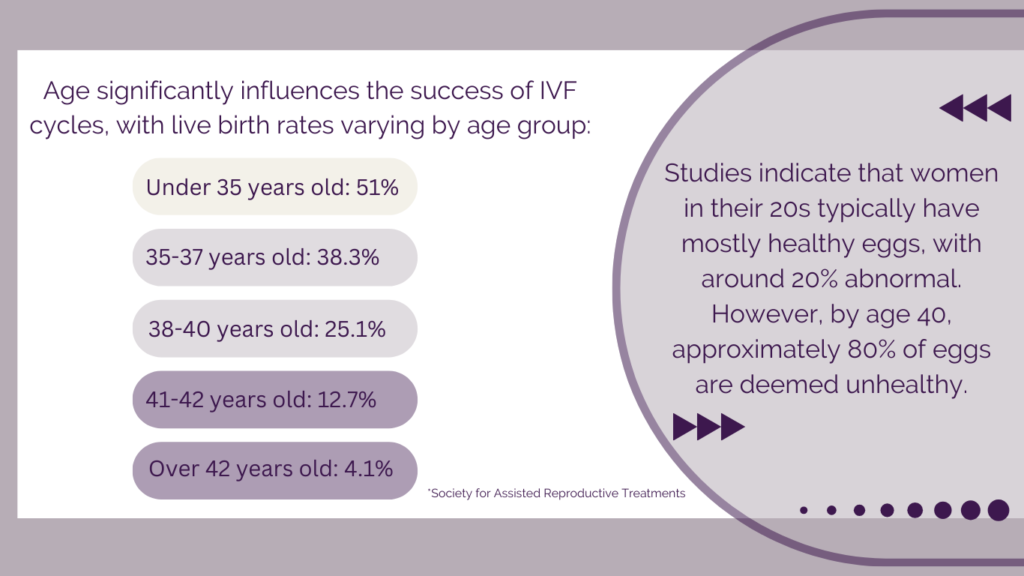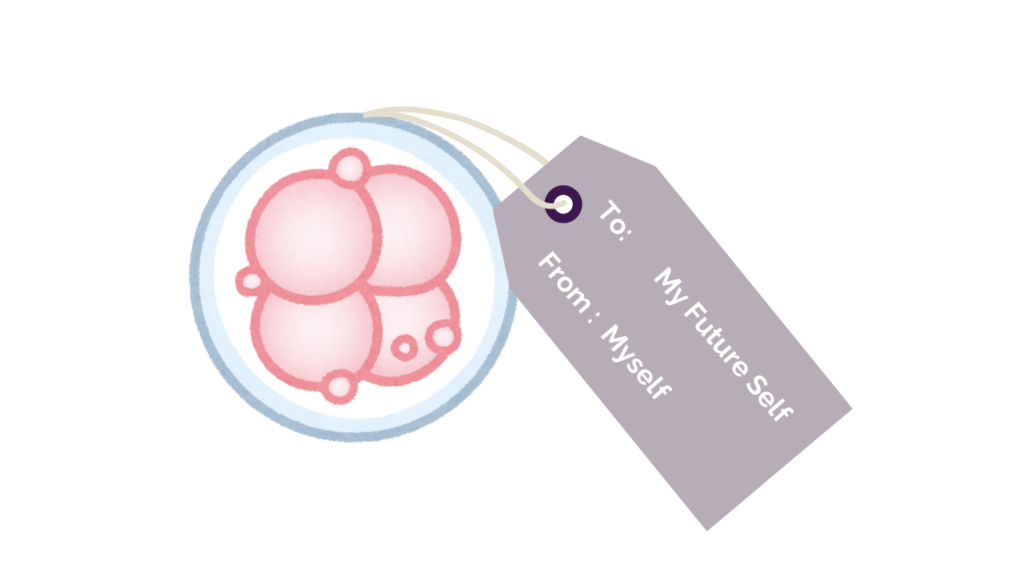Egg Freezing
Advancements in egg-freezing technology in the 21st century have significantly eased the tension between family and career for women. The American Society for Reproductive Medicine’s endorsement of egg-freezing technology in 2012 marked a pivotal moment, signaling its readiness for widespread use.
Pausing the Biological Clock
Cryopreserving eggs gives women control over their future fertility, allowing them to extend their reproductive years. This flexibility lets them plan their family while focusing on education or career without worrying about declining fertility. Freezing eggs at a younger age ensures higher success rates later, giving peace of mind for future family planning.

Egg Freezing Challenge
Egg freezing presents unique challenges due to the composition of human eggs, which contain 75-80% water compared to sperm’s 50-55%. This discrepancy makes egg freezing a delicate process, as ice crystal formation during freezing can potentially damage the egg and its protective shell.
A critical factor in the success of egg freezing is vitrification, a technique that rapidly cools the egg to around -196°C (-320°F). This process prevents ice crystal formation within the egg, transforming it into a glass-like state and preserving its integrity during storage. Vitrification has significantly improved the survival rates of frozen eggs, enhancing the chances of successful fertilization and pregnancy following thawing.
Experience is Crucial
However, egg freezing is a relatively newer technique compared to IVF, requiring laboratories with extensive experience in the procedure. Since egg freezing often precedes in vitro fertilization (IVF) for conception, selecting a clinic with high IVF success rates is paramount.
IVF USA has the Solution
The egg-freezing process involves two main stages: ovarian stimulation and egg retrieval. Candidates undergo approximately 10 days of medication during ovarian stimulation to stimulate egg development from the follicles, followed by the aspiration of the eggs.
Identifying reproductive centers with both advanced laboratory techniques and skilled doctors is paramount to ensure success. IVF USA has partnered only with doctors from reputable clinics in the United States, boasting over 15 years of egg-freezing experience and high IVF success rates. After six years of rigorous evaluation, IVF USA has carefully selected four such doctors from three clinics, ensuring the highest standard of care for egg-freezing patients.

We Have The Answers
Frequently Asked Questions
Under the guidance of a qualified healthcare provider, ovulation induction medication is typically deemed safe. There is minimal evidence linking these medications to early menopause, tumors, or obesity in women. Although some side effects like bloating, mood swings, or abdominal discomfort may occur, severe complications are rare. However, all medications carry potential risks and side effects, and ovulation induction drugs are no exception.
IVF USA has closely collaborated with our selected fertility specialists to simplify the IVF process. Typically, our clients find that a 5-7 day stay in the US suits their requirements. They start ovulation induction medication in their home country and proceed with egg retrieval and freezing procedures in the US. This streamlined approach not only cuts down on travel expenses but also minimizes disruptions to their regular work schedules.
Our US fertility doctors formulate the prescription and treatment plan for ovulation induction, utilizing medications from international pharmaceutical companies, which are identical to those used in the US
The egg retrieval procedure usually takes 15-20 minutes and is conducted under sedation or anesthesia. Most individuals do not feel pain during the procedure. Some patients may experience mild cramping or discomfort afterward, but this typically resolves within a few hours. Overall, egg retrieval is generally well-tolerated by patients.
Ovulation induction is achieved through medication. The required dosage, type of medication, and duration vary for each individual. The medications are administered for a specific duration and the patient is monitored closely with ultrasounds and blood tests to track follicle development and hormone levels.
Once the follicles containing mature eggs reach the desired size, a trigger shot of human chorionic gonadotropin (hCG) hormone may be given to induce ovulation. This is followed by the retrieval of eggs for fertilization in a laboratory setting.
IVF USA has curated a team of renowned experts offering top-notch care, expertise, and success rates in US fertility treatments. With extensive experience, advanced technologies, and proven track records, they significantly enhance the likelihood of success. This is particularly vital for women over 40, where time is a critical factor due to lower pregnancy rates. Collaborating with top IVF doctors is the key to maximizing success rates.
Chinese regulations prevent medical institutions from offering egg freezing and IVF treatment to unmarried women. However, egg freezing for broader applications, including fertility preservation, has been approved in the US since 2012. US fertility centers have over 15 years of experience in egg freezing, surpassing many Chinese institutions in technique, expertise and experience.
In the USA, laws permit doctors to offer various fertility services legally. This includes IVF treatments for single individuals, LGBTQ+ couples, and HIV-positive individuals, as well as recognition of surrogacy for same-sex families. US fertility centers are well-known for their specialized labs and experts. Genetic testing is permitted, ensuring that only the healthiest and most viable embryos are implanted.
Children born in the USA automatically acquire US citizenship, regardless of their parents’ nationality or that of the person who gave birth to them. They receive American birth certificates, social security numbers, and passports. The birth certificate displays the intended parents’ names, without revealing the surrogate’s identity. Alternatively, a birth certificate can be issued with only one parent’s name.
Typically, patients take ovulation induction medication for about 10 days, but this can vary based on the specific fertility treatment plan prescribed by their healthcare provider.
The egg retrieval procedure necessitates a stay of 5-7 days in the US. Your IVF clinic will collaborate with you to establish the optimal timing, considering your unique situation and travel arrangements. Candidates for egg freezing must confirm their decision at least 30 days before commencing the ovarian stimulation process. Flexibility in timing adjustments is available for those beginning the egg-freezing cycle through medication management.
While a standard schedule may include the following steps, personalized arrangements are also available:
- Begin ovulation induction in your home country
- Friday: Travel to the US
- Saturday: Morning consultation with the doctor
- Sunday: Sightseeing and shopping, travel to the US (arrive in the US at the latest)
- Monday: Morning consultation with the doctor, sightseeing, and shopping
- Tuesday: Sightseeing and shopping
- Wednesday: Morning consultation with the doctor (about an hour), local sightseeing
- Thursday: Egg retrieval or egg freezing; or sightseeing, shopping, or egg retrieval
- Friday: Egg retrieval or egg freezing; sightseeing, shopping, or return home
Over the past 40 years, in vitro fertilization (IVF) has been a cornerstone of assisted reproduction. While some large hospitals in China have conducted more IVF cycles than US fertility centers, the US stands out in success rates, clinical expertise, medication protocols, laboratory equipment, staff proficiency, and comprehensive service systems. Notable distinctions include:
- Greater flexibility in US reproductive laws and regulations
- Advanced genetic testing technology for precise embryo selection
- Comprehensive surrogate services offered in one location
- Children born in the US are automatically granted US citizenship
In the US, approximately 1300 licensed doctors specialize in assisted reproduction and IVF, making it challenging to find the right expert. Many reputable reproductive specialists operate regionally and may not extensively advertise online. When selecting an IVF clinic, prioritize those with modern and robust laboratory facilities and experienced embryologists. Key considerations should encompass success rates, legal safeguards, the level of technological advancement in the laboratory, and other relevant factors. IVF USA has relieved you of this burden by dedicating years to evaluating IVF clinics and partnering with only the very best.
Deciding between egg freezing and embryo freezing depends on several factors, including age, personal situation, and reproductive health. Married women over 40 may find embryo freezing preferable, while single women might choose egg freezing to preserve their fertility. In cases involving health concerns like cancer treatments, freezing eggs for future fertility preservation is a significant consideration.
Eggs can theoretically be preserved indefinitely, especially with advanced freezing methods like vitrification used in reputable fertility clinics. As long as they are stored under optimal conditions, frozen eggs maintain their viability for future use in fertility treatments. However, since egg freezing is a relatively recent technique, there is limited clinical data available to confirm its long-term effectiveness definitively.
However, egg freezing is a relatively new procedure and there is not enough clinical data to make an accurate assessment.
Preparing for conception involves several important steps, beginning with the inclusion of vital supplements like folic acid, Coenzyme Q10, and multi-vitamins into your daily routine at least a month before attempting to conceive.
Understanding the impact of age on fertility is essential. Ideally, the prime age range for considering egg freezing is between 30 and 38 years old, as fertility declines significantly beyond this period. After 35, fertility decreases by half, with a rapid decline in ovarian function, resulting in a high likelihood of chromosomal abnormalities in eggs, leading to increased miscarriage rates and reduced embryo quality.
Women over 40 face even greater fertility challenges, with rates dropping to less than 12%, and an increased risk of chromosomal anomalies in embryos. Beyond 45, natural conception rates plummet below 5%, with a staggering 90% chance of chromosomal abnormalities, necessitating serious consideration of third-party surrogacy options.
In this age group, IVF treatments, including pre-implantation genetic testing (PGT), become essential for optimizing pregnancy rates and reducing miscarriage risks.
Regular fertility testing, lifestyle adjustments, and proactive measures such as egg freezing or frozen fertilized egg storage empower women to make informed decisions about their reproductive futures.
Contact us today for a free consultation and discover how we can help you start your family.
We listen, we understand, we deliver—tailored services to meet your unique needs, because what matters to you, matters to us.

